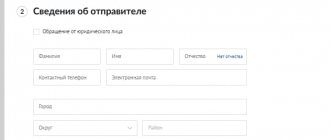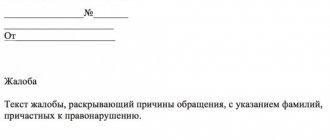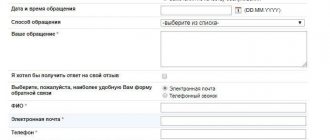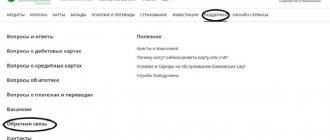A complaint against a school teacher is a document prepared by the parent (legal representative) of a student addressed to an official or regulatory organization in order to indicate significant violations on the part of a teacher of an educational institution. In 2021, when the issue of bullying is particularly relevant, every parent should know the grounds for filing a complaint, and should also be familiar with the procedure for sending a letter of complaint.
- Grounds for filing a complaint
- Where can I file a complaint?
- How to properly file a complaint
- Teacher Responsibility
- Samples of complaints against school teachers
Grounds for filing a complaint
Destroying stereotypes, it should be noted that filing a complaint is advisable not only in case of significant violations on the part of the teacher. Thus, a parent or legal representative of a minor citizen can initiate an inspection regardless of the complexity of the violation. This issue is regulated by the provisions of the Federal Law “On Consideration of Citizens’ Appeals”.
This regulatory legal act provides that Russian citizens can send written appeals to state and municipal authorities, as well as to other authorities that perform control and supervisory functions.
Attention! Accusations must not be unfounded, that is, each claim must be substantiated or supported by documents.
The legislation does not limit the list of violations for which it is permissible to file a complaint against the actions of a teacher. But an analysis of practice allows us to highlight the following – the most common points :
- the use of physical force (in this case, the presence of visible bodily injuries is not enough);
- a complaint for insulting a student (this category includes all facts of psychological violence against a student);
- claims of teacher incompetence or failure to fulfill assigned duties;
- collecting money from students, which is not agreed upon in advance;
- Complaining about a teacher for being biased towards a student (bias can come in many forms, so the parent should describe in detail what exactly he or she means in a particular situation);
- the teacher demands something that is not provided for by the program or creates dangerous situations during the educational process;
- the use of educational measures that limit/violate the rights of the child or are completely contrary to current legislation;
- the teaching method inhibits the child’s development or contributes to the occurrence of mental disorders;
- issuing grades that do not correspond to the level of knowledge or increased requirements for a particular student.
In practice, there are often situations where a teacher simply kicks a child out of class for violating discipline. This innocent action is a direct violation of the constitutional rights of children, since the Constitution of the Russian Federation guarantees every child the right to receive an education and access to the education system.
Who can file a complaint
The law establishes that a claim can be individual or group. This means that only one parent of the class or several parents concerned about the current situation can prepare a letter of complaint against the teacher.
As for authority, the letter can be prepared and sent to:
- the child's parent;
- guardian;
- trustee;
- by the adoptive parent, but only after completion of the adoption procedure.
Question answer
Question: The teacher does not fulfill his duties. The dean's office and the rector do not respond to complaints, citing the fact that he is the only specialist in his field. Where else to complain?
Answer: Contact the Department of Education on the basis of Art. 89 Federal Law “On Education”.
Question: At my university there is a teacher who is constantly late, even for tests and exams. On different days, the delay ranged from 30 minutes to 1.5 hours. Where can I complain?
Answer: You should start with a collective complaint addressed to the dean of the faculty, and if there is no desired result, contact the rector and other authorities.
Question: My daughter often complains about insults and boorish attitude from one of the teachers, but she is afraid to record audio or video material for evidence. By the way, everything is fine in other subjects, the performance rating is the highest in the group. How to complain?
Answer: If the daughter is an adult, she must file a complaint on her own. The document is drawn up in simple written form addressed to the dean or rector.
Question: The teacher constantly finds fault with any words, he has already brought me to tears several times. Only classmates present in class can confirm. Can I use their words as evidence? How to register them? Where to complain?
Answer: File a complaint with the rector of the university and the Prosecutor's Office. You can present written evidence in the text. Be sure to “remind” the existence of Art. 336 of the Labor Code of the Russian Federation, which defines additional grounds for termination of an employment contract with a teacher. One of these is the use of educational methods associated with physical or mental violence against an individual.
Question: Is it possible to file a complaint against a teacher anonymously?
Answer: Anonymous complaints in most cases remain unconsidered. Employees of the authorized body are required to send a response to the received request to the sender, but in this case there is no response. But exceptions and additional checks are possible if the appeal involves serious offenses.
Question: The teacher demands (not only me) to pay for his master class for 4,000 rubles, otherwise he threatens to be denied access to the state. How can you prove that this is a demand for a bribe? Where to complain?
Answer: Contact the district prosecutor's office. If the appeal is collective and not individual, you can count on a faster response.
Where can I file a complaint against a school teacher?
The procedure for considering appeals is directly related to the essence of the violation, as well as the resulting consequences. This is due to the fact that there are several types of responsibility for teachers, and there are also a number of multi-level authorities authorized to resolve conflicts and hold guilty teachers accountable.
In 2021, a legal representative of a minor student may file a formal complaint with the following organizations:
- Submitting an appeal to senior management, which is the head teacher of the school or the director. As practice shows, 70% of conflicts can be resolved in this way. The boss of a particular teacher applies local measures (and sometimes just a verbal conversation is enough) to stop the violation.
- Educational authorities, which are represented by the city department, department and Ministry. Claims must be submitted in this order as authority develops. That is, first the complaint is sent to the city department and only if this does not help, then the letter is passed on. In this case, it must be remembered that the organization has only ten calendar days to prepare a response to the applicant.
- Law enforcement agencies, represented by the police and the prosecutor's office, begin work only if there is an administrative or criminal offense in the teacher's actions. At the request of the parent, criminal proceedings are initiated or a protocol on an administrative offense is drawn up. Next, an investigation is conducted, which ends with the closure of the case or its transfer to court.
- The court is the last resort, the participation of which is mandatory, if necessary, to withhold from the teacher the amount of material or moral damage. To receive payment, the parent prepares a statement of claim, supporting it with the necessary documents.
Attention! When accepting a claim, the court requires to show papers indicating that the parent tried to resolve the conflict peacefully. That is, there must be copies of appeals and responses to the administration of the educational institution and the education department.
How to correctly write a complaint against a teacher depends on where the complaint is filed. Mandatory conditions and useful tips:
- when submitting a complaint to the director, it is advisable to prepare two copies at once, one of which remains with the applicant, but with a note that the appeal has been accepted;
- when sending an appeal to the education departments, it is necessary to indicate not only the child-teacher conflict, but also the futile attempts to resolve the conflict peacefully (this indicates that the administration of the educational institution not only covers up, but also encourages the behavior of the teacher);
- in case of filing a complaint with law enforcement agencies, the applicant must indicate what offense/crime he sees in the actions of the teacher (indicating the article of the law does not exclude that the police/prosecutor will change the qualification to another article, but this is a mandatory condition, since filing an appeal with the police or prosecutor’s office is possible only if there is evidence of a crime).
Directing an anonymous appeal
The legislation on the consideration of applications and complaints from citizens puts forward strict requirements for such letters. One of the essential conditions is to indicate the full name and contact information of the applicant. This is necessary so that the competent organization can prepare a formal response and can clarify important information necessary for a full investigation of the violation.
On the other hand, the work of each of these authorities is structured in such a way that citizens can apply anonymously, without indicating their identity. This is legal, but it is unlikely to help resolve the conflict. There will be a response to anonymous complaints, but there is no one to account for the work done. Therefore, you should not expect that this will resolve the conflict. The only possibility in this case is mass appeals from dissatisfied parents.
How to properly write a letter of complaint
The law does not provide for a strict form of appeal, but the applicant must include the following elements in the content of his claim:
- indication of the addressee, that is, the official or specific organization for whose consideration the application is being submitted;
- personal data of the applicant (full name, contact details);
- description of the essence of the violation;
- the consequences that occurred;
- ways to resolve conflict;
- legal requirements;
- date and signature.
It would be a good idea to attach copies of supporting documents to your application. In this case, all papers are numbered, and a single inventory of materials is prepared. It is advisable to provide evidence even when sending a complaint to the director.
The following rules for document execution should also be taken into account:
- sequence of presentation of facts;
- legible writing;
- absence of obscene expressions and emotional phrases;
- absence of errors, blots and corrections;
- avoiding threats and personal speculation, as well as individual insults.
If the appeal is prepared on behalf of the team, then the content must indicate the data of all interested parties and the occurrence of specific consequences for each of them.
When to complain
Possible reasons for complaints against a teacher include:
- failure to fulfill professional obligations (failure to attend lectures, seminars, teaching outdated material, etc.)
- biased attitude/inflated demands that differ from those imposed on other students;
- coercion to perform certain actions (attend additional classes, events, excursions);
- insult, humiliation, discrimination;
- demand for money (for admission to exams, obtaining certain grades), etc.
Both one student and several people from a certain group or faculty have the right to complain about a violation of interests. In the latter case, the appeal will be collective, which is considered a more effective way to solve the problem.
Applicable types of liability
Often, the parent is not interested in the possibility of bringing the teacher to legal liability. Legal representative. As a rule, he looks for ways to refuse a teacher who annoys the child. But at the same time, depending on the type of violation and the resulting consequences, the teacher may be held accountable for different types of liability:
- disciplinary;
- administrative;
- criminal;
- civil.
Disciplinary punishment
Disciplinary action can only be applied by the administration of the educational institution or by employees of the education department. For this purpose, an official investigation is carried out, during which not only the claim is studied, but also an explanation is taken from the guilty party, that is, from the teacher. The teacher has the right to defend himself and prove the legality of his actions.
At the end of the investigation, the inspecting party prepares an order imposing disciplinary punishment, which can be in the form of an oral or written reprimand, as well as dismissal. What consequences will occur in a particular case depends on the severity of the dispute, as well as the consequences and the number of affected parties.
Attention! Wrongful dismissal can be challenged by a person in court, so it is necessary to strictly follow the procedure without violating the rights and interests of the teacher himself.
The second point to pay attention to is the early termination of an employment contract at the unilateral initiative of the employer. When drawing up a work contract, additional clauses are added to the content of the agreement, which may become grounds for dismissal. In particular, this concerns a significant violation of the rights and interests of children (for example, the use of physical force or psychological violence).
Administrative responsibility
The Code of Administrative Offenses provides for two types of offenses for which there is liability under the Code of Administrative Offenses of the Russian Federation. The first group is a violation of the child’s right to education. In particular, this applies to putting children out the door during the educational process. A teacher who commits such actions may be punished with an administrative fine, the amount of which will vary from 30 to 50 thousand rubles.
If such a violation is repeated, the teacher may be deprived of the right to engage in teaching activities for a period of up to one year.
The second group of violations is related to the implementation of the educational process itself. If it is confirmed that the teacher’s actions disrupt the learning process, he will face a fine of up to 30,000 rubles.
Punishment is applied only by a judge based on the administrative material compiled by the police.
Punishment under the Criminal Code of the Russian Federation
A teacher, as an official, may be subject to various articles of the Special Part of the Criminal Code. This also applies to the infliction of bodily harm, confirmed by the conclusion of a forensic expert. In this case, criminal proceedings are drawn up, which are investigated in the general manner. The teacher must be prepared for the fact that the measure of responsibility will not be the weakest, since there is an aggravating circumstance - the teacher commits a crime against his subordinate, a child who cannot independently protect his interests.
Attention! A ban on teaching activities is used as an optional punishment.
In addition, there is one rule under which only teachers can be held criminally liable. This is a cruel violation of the right to education. The extent of liability depends on the individual characteristics of the case. Thus, a teacher may suffer the following types of punishment:
- a fine, the amount of which cannot exceed 100,000 rubles or cannot be higher than the person’s annual income;
- no more than three years of forced labor with mandatory deduction of part of the profit to the state (from 5 to 20 percent of wages);
- up to three years in prison;
- deprivation of the right to engage in educational activities for a period of up to five years.
Civil responsibility
The Civil Code of the Russian Federation provides for the possibility of individuals to receive monetary compensation for material and moral damage caused. The presence of conflicts between teachers and students is no exception. Moreover, filing a lawsuit to withhold compensation may occur regardless of the accompanying investigation.
The child's legal representative who believes there are sufficient grounds to receive the money must do the following:
- obtaining supporting facts that there are grounds for receiving compensation;
- collection of evidence indicating the guilt of the teacher, as well as the legality of the demand for monetary payment;
- calculation of the amount of compensation (confirmation of the amount with financial documents);
- preparation of a substantiated statement of claim, which is sent to a federal court of general jurisdiction, taking into account the requirements of territorial jurisdiction.
Withholding moral damages is a little more difficult in practice, since it is not easy to prove. On the other hand, the teacher’s unlawful actions violate the rights and interests of minor children, so the amount of compensation will be much higher.
Attention! It is permissible to prepare and submit a collective claim to the court.
Thus, the law provides a lot of possibilities for which legal representative can protect the interests of a minor child. If there are doubts that it will be possible to achieve justice, then you can involve a qualified lawyer in the conflict who will help resolve the dispute.









